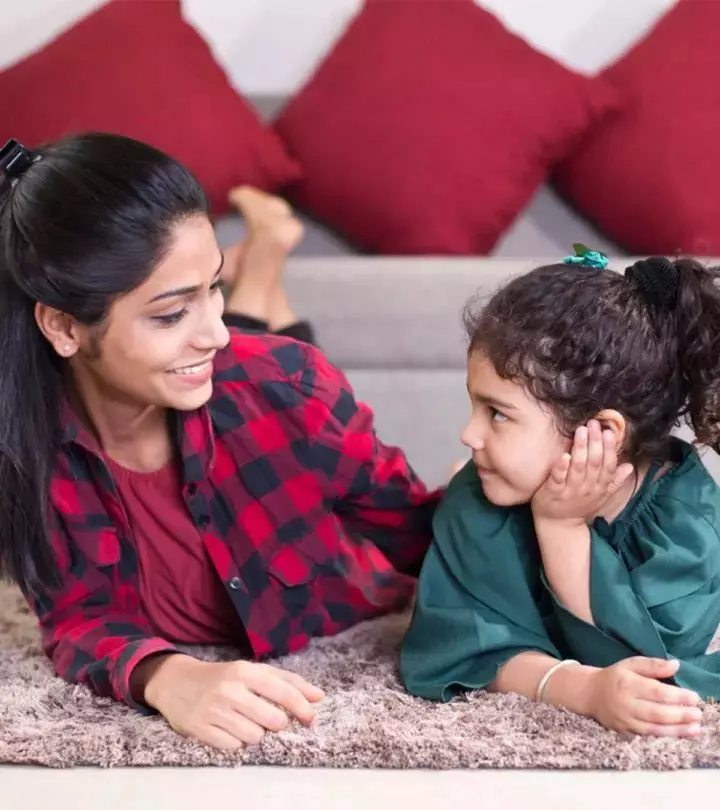
Image: Shutterstock
It is common to make mistakes, both for parents and children alike. And with parenting being one of the most challenging and responsible jobs out there, it is undoubtedly possible for errors to crop up every once in a while. No matter how careful you are, you’ll falter. So, if you feel like you’ve made some mistakes in your parental duties, instead of crying over it, just focus on correcting it and not repeating it.
Each one has their parenting style, and there are genuinely no one-size-fits-all instructions that cater to the individual needs of every child or the family as a whole. However, parents should avoid some mistakes for children to grow into healthy and happy adults. The following is a list of frequently-committed parental errors that you must identify and rectify when things go south. Read on to know if you can identify any of these harmful parenting behaviors:
1. Resorting To Hypocritical Behavior

Image: Shutterstock
Like all parents, you may have the best advice to nurture your child into good human beings. You can regularly chaperon them on being kind, helpful, regulate their emotions, or preach to them to stay away from bad habits. But it won’t do much good if you commit the same things you ask them to stay away from, like smoking a cigarette while you rattle off harmful repercussions of the same while disciplining them. They are unlikely to follow your advice unless you model the exact healthy behaviors you want them to display. So, instead of lecturing them all the time about how they’re not doing something right, nudge them towards the activity you want them to do.
2. Being Over-Protective

Image: Shutterstock
Yes, as a parent, you are expected to support your child from all harm. However, you should know that your child must learn the consequences of their actions. They should be responsible for the choices they make. So, if you want them to become independent and righteous, allow them the space to act and face the consequences rather than taking their bullets or waging war on their behalf. Let them do things and understand where they go wrong, and discern the right way to react or behave to avert less-than-desired outcomes.

Image: Shutterstock
We are all caught up in our busy schedules. But making quality time for our children is good for molding them into well-adjusted people. No matter how withdrawn they may seem, children crave the undivided attention of their parents. They want to confide in you. So, if you want your kids to open up to you, be friends with them, and help them understand that they are important and irreplaceable to you. Be there for them and listen to them. Keep work or television away for a designated hour when you are with your children. Gradually they will surely notice your attentiveness and start confiding in you more.
4. Setting High Expectations

Image: Shutterstock
Parents wish the best for their children. They want them to be successful and accomplish great things in life. However, they may often dump their expectations on them in that stride, pushing them to fulfill their dreams, things they couldn’t achieve when they were young. This “overachiever” push will make your child feel burdened and competitive, setting the pace for disappointment and fear of failing. Kids feel torn between their interests and that of their parents. When you advise your child to chart their future path, make an effort to learn about their wishes, where their passions lie and control the urge to dump your personal goals aside. Let them figure out their wants without the burden of crushing their dreams to please you.
5. Neglecting Your Marriage

Image: Shutterstock
Children are a beautiful addition to your relationship. While you may want to make them the center of your universe at the cost of jeopardizing your relationship, it could be detrimental down the line. All the love and attention focused on your child cannot be compared to the impact of a healthy relationship between parents. Both parents — mother and father are essential for a child’s growth and development. Any adverse childhood experience like parental separation, exposure to violence, or marital discord can lead to mental, emotional, and even physical disabilities. Always make time to nurture your relationship with your partner so that both of you are equally involved in raising your kid (1).
6. Neglecting “Me-Time”

Image: Shutterstock
Parenting is no joke. It can take a tremendous toll on your mental and physical health. Therefore, it is necessary to practice self-care. You deserve it. This will allow you to recuperate and gain back your strength to support and sustain the family. If you are a single parent, this is doubly vital as you are solely in charge of making decisions at home and the outside world to make both ends meet. Neglecting little breaks in your schedule is bound to leave you drained and unmotivated to handle the demands of parenthood.
7. Reacting Immediately Without A Thought

Image: IStock
Children can sometimes be hard to deal with. They might push all your buttons to make you lose your calm and react impulsively. However, it’s essential to control your temper and think before communicating rashly or raising your hand. Things that you do can leave a long-lasting impact on your child — both positive and negative. So, exercise great caution before you take a step, no matter how well-intentioned you are. Take a pause, reflect on what went wrong and devise a plan to solve the issue with compassion and love.
Even the most well-intentioned thoughts and behaviors can indeed go wrong and push your child to behave oddly. They can become depressed, anxious, and traumatized. They may resort to self-harm or even become bullies as a result of these upbringing techniques. However, you don’t need to be too hard on yourself if you have found yourself committing these parental sins. What’s important is that you learn and grow along with your child. Stay open and observant. It will help you shape them into mentally and physically strong adults in the long run. What are your thoughts on this? Do share your views with us in the comments below!
Community Experiences
Join the conversation and become a part of our nurturing community! Share your stories, experiences, and insights to connect with fellow parents.












